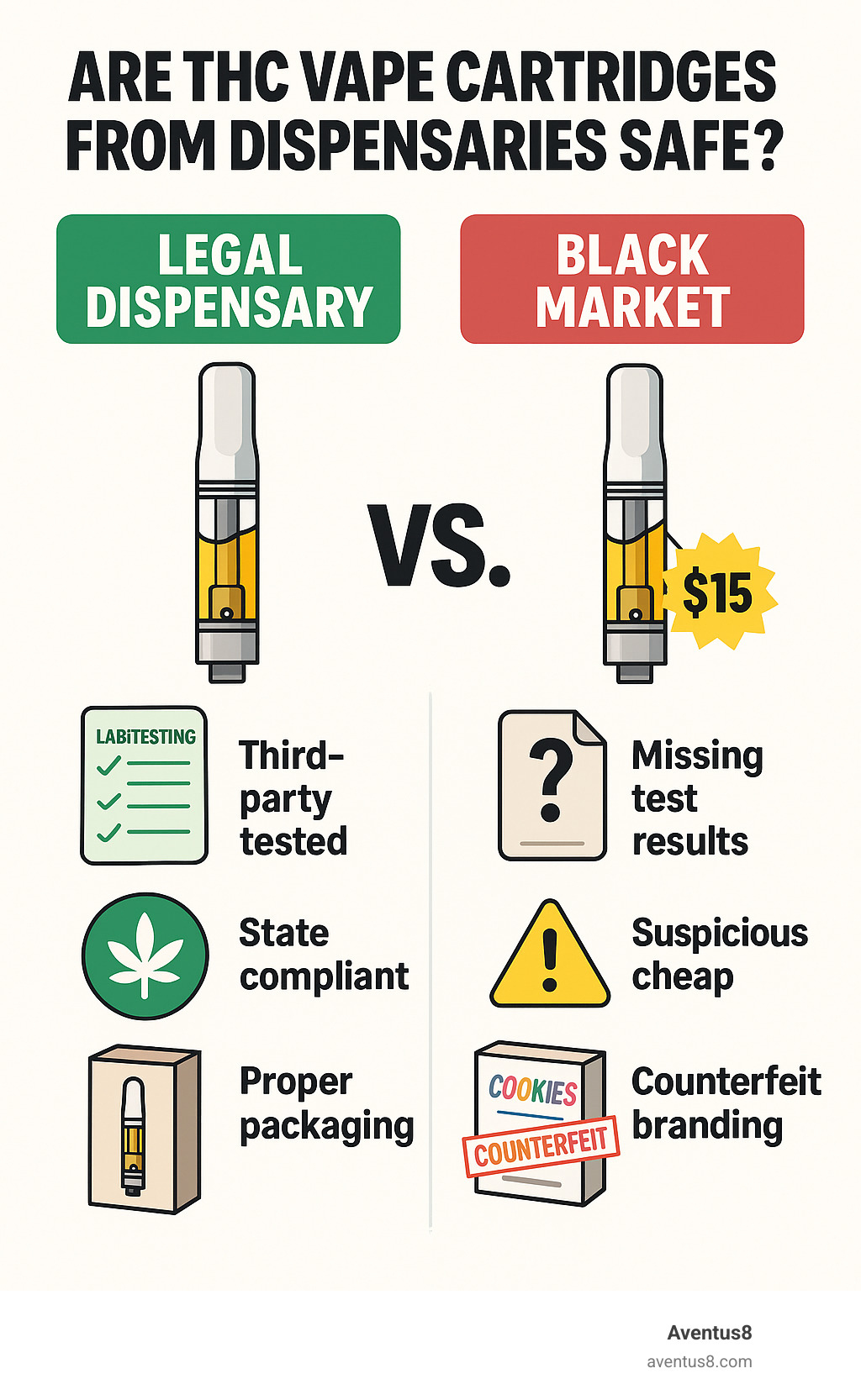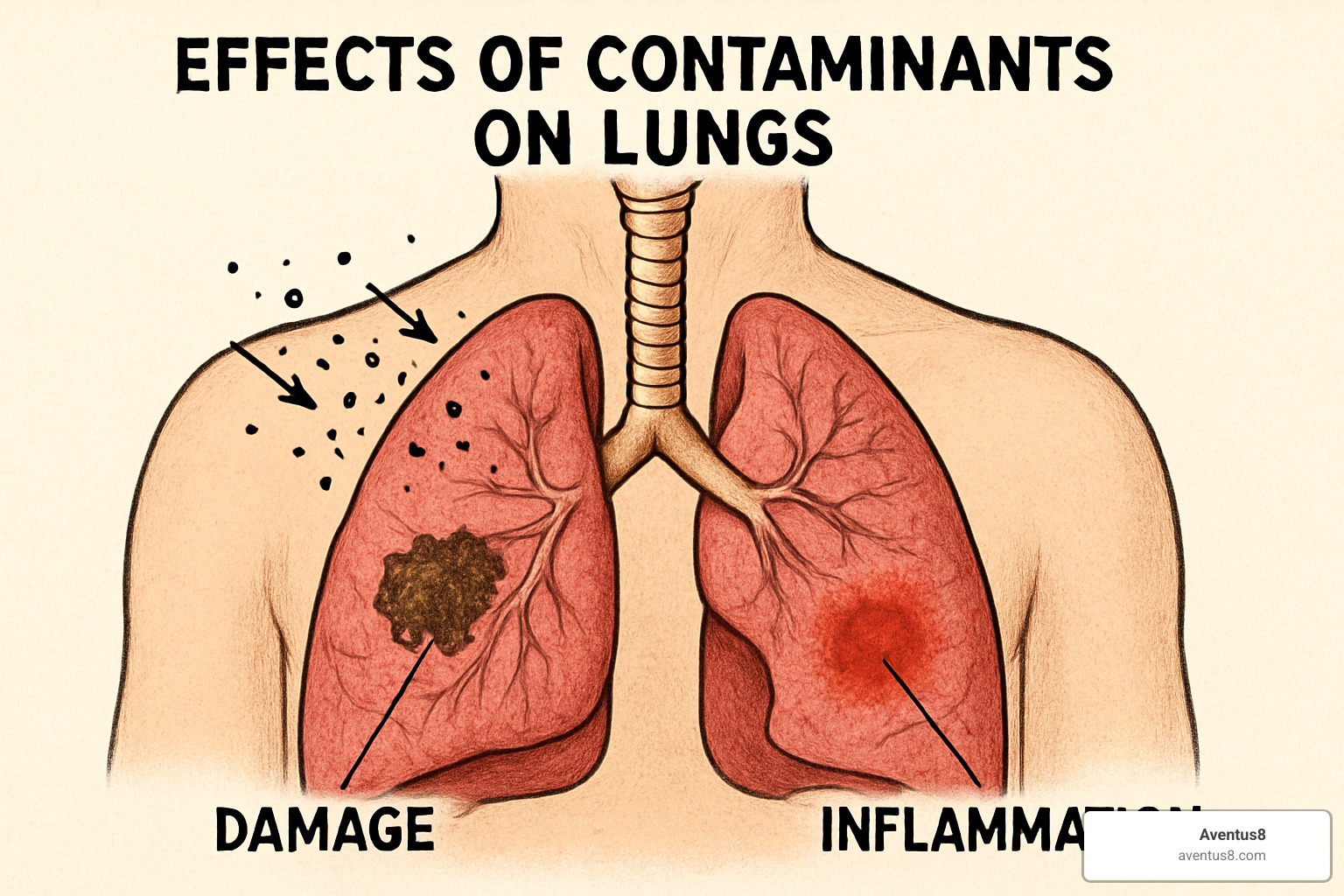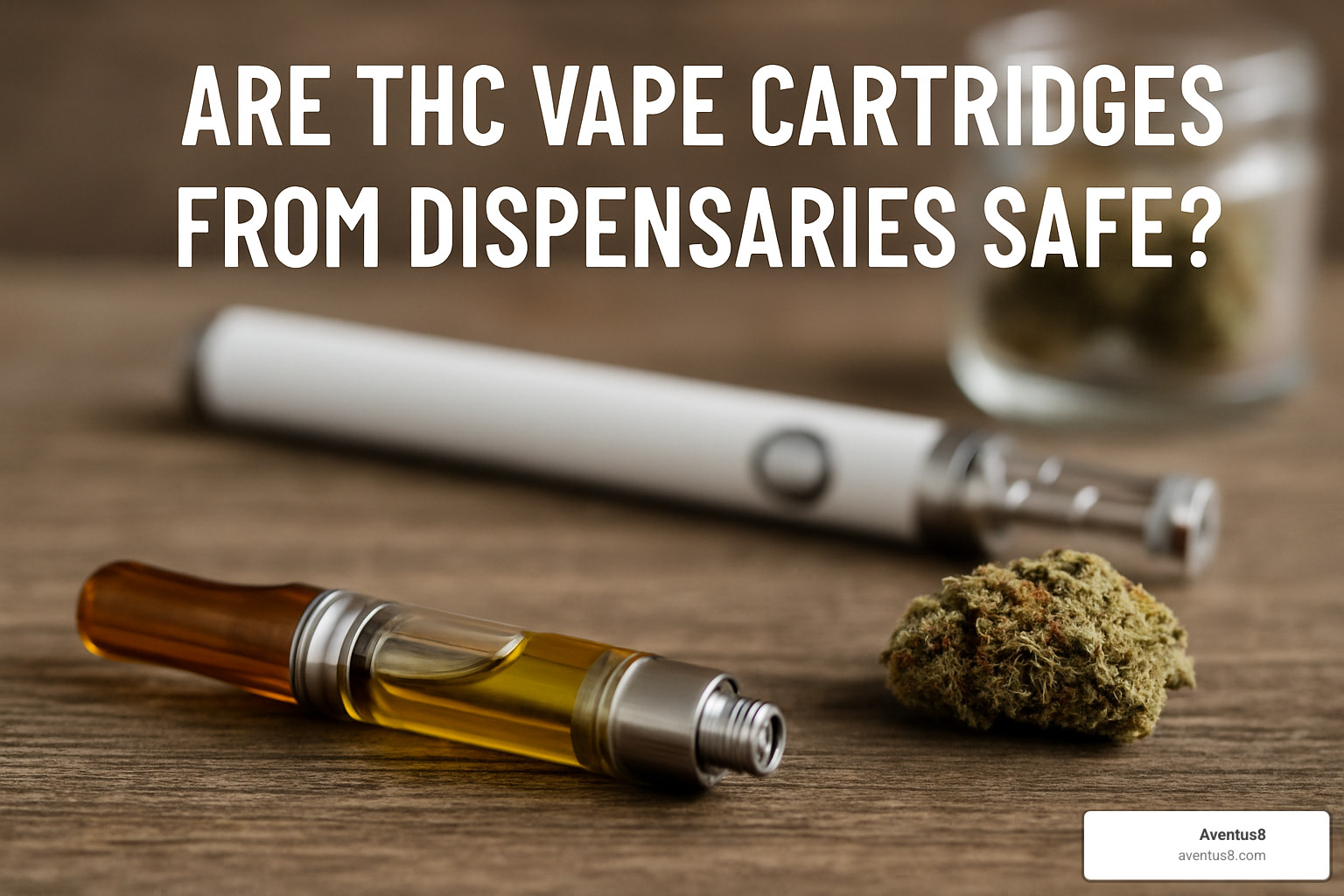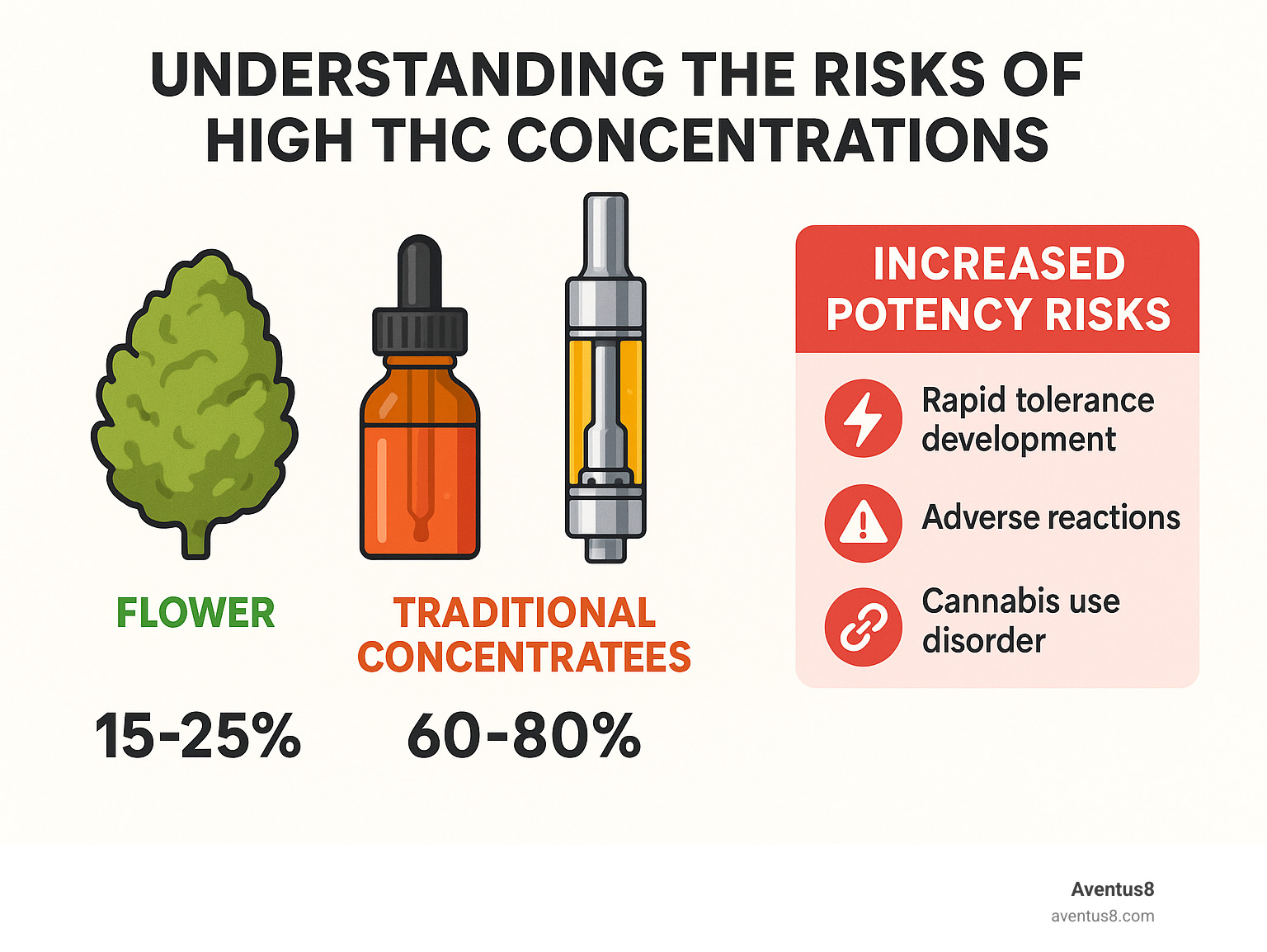High Standards—How Safe Are Dispensary THC Vape Cartridges?
The Great Vape Debate: Separating Fact from Fiction
Are THC vape cartridges from dispensaries safe? The short answer is yes - they are significantly safer than black market alternatives due to mandatory state testing and regulation. However, like any inhalation method, they are not entirely risk-free.
Quick Safety Facts:
- Legal dispensary cartridges: Tested for contaminants, pesticides, and heavy metals
- Black market cartridges: Untested, often contain dangerous additives like vitamin E acetate
- EVALI outbreak: 2,500+ hospitalizations, mostly linked to illicit THC products
- Legal state advantage: 1.7 EVALI cases per million vs. 8.1 in prohibition states
The 2019 EVALI outbreak changed everything. More than 2,500 people were hospitalized and nearly 70 died from vaping-related lung injuries. 82% of cases involved THC products - but here's the key detail most people missed: these weren't dispensary products.
The real story isn't about THC being dangerous. It's about where you get it.
Licensed dispensaries follow strict state regulations. They test every batch for harmful chemicals. Black market dealers don't. It's that simple.
But the conversation doesn't end there. Even safe, legal cartridges come with considerations around potency, tolerance, and proper use that every consumer should understand.
I'm Max Shemesh, CEO of Aventus8, and I've spent years navigating the complex world of cannabinoid safety and regulation. Understanding are THC vape cartridges from dispensaries safe has been central to building trust with our customers who deserve transparency about what they're consuming. Let me walk you through what the data actually shows.

Glossary for are thc vape cartridges from dispensaries safe:
The Core of the Concern: Understanding Vaping Risks and EVALI
Let me tell you about the health crisis that changed everything we thought we knew about vaping safety. It started in the summer of 2019, when emergency rooms across the country began seeing something they'd never encountered before.
Young, healthy people were arriving with severe lung injuries. They were struggling to breathe, coughing up blood, and some were fighting for their lives. The only thing they had in common? They'd been vaping.
The medical community scrambled to understand what was happening. By the time the dust settled, the Outbreak of Lung Injury Associated with the Use of E-Cigarette, or Vaping, Products had a name: EVALI (e-cigarette or vaping product use-associated lung injury).
The numbers were staggering. Over 2,500 people were hospitalized. Nearly 70 died. And here's the crucial detail that explains why THC vape cartridges from dispensaries are safe: 82% of these cases involved THC products from the black market.
The Smoking Gun: Vitamin E Acetate
After months of investigation, the CDC identified the culprit. It wasn't THC itself - it was vitamin E acetate, a thickening agent that illegal manufacturers were using to cut their products and boost profits.
Here's the twisted logic: vitamin E acetate is perfectly safe to eat or put on your skin. But when you heat it up and inhale it? That's a completely different story. Research published in A mechanical mechanism for vitamin E acetate in e-cigarette/vaping-associated lung injury showed exactly how this substance damages lung tissue when vaporized.
Think of it like this - you wouldn't drink motor oil, even though it's fine in your car's engine. Context matters, and the context of heating and inhaling vitamin E acetate turned a "safe" substance into a killer.
The Toxic Cocktail in Black Market Cartridges
But vitamin E acetate was just the beginning. When researchers tested illicit cartridges, they found a horror show of dangerous substances that would never pass dispensary testing.
Heavy metals like lead and cadmium were leaching from cheap hardware. Some cartridges contained pesticide levels that were thousands of times over legal limits. Residual solvents like butane and hexane - chemicals that should be completely removed during proper extraction - were still present. And synthetic flavorings including diacetyl, which has been linked to serious lung disease, were being added without any safety testing.

Why This Crisis Proved Regulation Works
Here's the most important fact from the entire EVALI outbreak: not a single case was linked to legal, state-licensed cannabis products. Zero. This wasn't luck - it was the direct result of the testing and safety standards that licensed dispensaries must follow.
The crisis actually strengthened the case for legal cannabis markets. States with legal dispensaries saw significantly lower rates of EVALI cases compared to prohibition states where people had no choice but to turn to dangerous black market products.
This is why understanding EVALI is so crucial for anyone asking are THC vape cartridges from dispensaries safe. The answer is a resounding yes - because the entire regulatory framework was designed to prevent exactly what happened in 2019.
For a deeper dive into these safety considerations, I recommend reading our comprehensive guide on Weed Pens Safety: A Deep Dive Into Risks And Benefits.
The EVALI crisis was tragic, but it taught us something invaluable: the source of your cannabis products matters more than anything else.
Dispensary vs. Black Market: A Tale of Two Cartridges
When people ask are THC vape cartridges from dispensaries safe, the answer begins with the gulf between regulated and unregulated products.
Why Dispensary Cartridges Offer a Higher Standard of Safety
Licensed dispensaries must submit every batch for mandatory lab testing covering potency, pesticides, heavy metals, microbes, and residual solvents. Packages carry QR codes or batch numbers linked to a Certificate of Analysis (CoA) so you can confirm the results yourself.
State rules differ, but all are strict. California screens for 66 pesticides, Oregon bans vitamin E acetate outright, and Maryland requires heavy-metal testing. The impact is clear: legal states averaged only 1.7 EVALI cases per million people versus 8.1 in prohibition states (see Association of state marijuana legalization policies with vaping lung disease).
For practical shopping tips, check out An Essential Guide To Finding The Best THC Vape Cartridges.
The Dangers of the Illicit Market
The black market is the Wild West: no rules, no testing, no accountability.
Popular “brands” like Dank Vapes were never real companies—just empty boxes anyone could buy online. Dealers filled them with mystery oil cut by the cheapest additives, including the vitamin E acetate that fueled EVALI.
Red flags are easy to spot:
- Rock-bottom prices
- No QR code or batch number
- Low-quality or misspelled packaging
- Sales through gas stations, social media, or unlicensed shops
These warning signs are illustrated in the CDC’s visual dictionary.

So, Are THC Vape Cartridges from Dispensaries Safe? A Comparative Look
Now that we've established the regulatory framework, let's directly address the core question: are THC vape cartridges from dispensaries safe? The answer requires understanding safety in context - compared to what?
Safety isn't absolute - it's relative. A dispensary THC cartridge is dramatically safer than a black market one, but how does it stack up against other ways of consuming cannabis? Let's dig into the real comparisons that matter.
Vaping THC vs. Smoking Marijuana
When people ask about vaping safety, they're often comparing it to smoking cannabis flower. The difference is like comparing a controlled burn to a wildfire.
The Combustion Problem
Smoking cannabis involves combustion, which creates a cocktail of harmful byproducts. When you light up flower, temperatures reach over 2,000°F - hot enough to break down plant matter into dangerous compounds.
This process creates carcinogens including benzene, toluene, and naphthalene. You're also inhaling tar - that sticky residue that accumulates in your lungs over time. Add carbon monoxide (which reduces your blood's oxygen-carrying capacity) and particulate matter (tiny particles that can damage lung tissue), and you've got a recipe for respiratory problems.
Vaporization Advantages
Vaping takes a completely different approach. Instead of burning, it heats cannabis oil to temperatures between 315-440°F - hot enough to activate cannabinoids but cool enough to avoid combustion.
This gentler process reduces carcinogen production by up to 95% and eliminates tar formation entirely. You're also preserving more cannabinoids and terpenes, which means better flavor and potentially more therapeutic benefits.
Research published in Are vaporizers a lower-risk alternative to smoking cannabis? confirms that vaporization significantly reduces exposure to harmful combustion byproducts.
Important Caveat: Not Risk-Free
Here's where I need to be completely honest with you. While vaping is less harmful than smoking, it's not risk-free. Any form of inhalation carries potential risks, including respiratory irritation, potential lung inflammation, and unknown long-term effects of chronic use.
Think of it like this: if smoking is like driving without a seatbelt, vaping is like driving with modern safety features. It's significantly safer, but you're still operating a vehicle.
Vaping THC vs. Vaping Nicotine
The comparison between THC and nicotine vaping reveals important differences that many people don't consider.
Different Active Ingredients, Different Risks
THC and nicotine affect your body in completely different ways. THC produces psychoactive effects and has potential for tolerance and dependence, while nicotine is highly addictive and affects your cardiovascular system.
But here's where it gets interesting - the real safety differences often come down to what's carrying these compounds, not the compounds themselves.
Carrier Liquid Differences
This is where the EVALI connection becomes crucial. Nicotine vapes typically use propylene glycol and vegetable glycerin - substances that have been studied extensively. THC vapes originally used similar carriers, but vitamin E acetate was added to illicit THC products specifically to cut costs and increase profits.
Research in Differential pulmonary effects of vaping CBD vs nicotine suggests that the carrier liquids and additives, not necessarily the active compounds, may be the primary safety concern.
The EVALI Connection
Here's a fact that might surprise you: the vast majority of EVALI cases involved THC products, but this was due to vitamin E acetate contamination in illicit cartridges, not THC itself. Legal, tested THC cartridges don't contain this dangerous additive.
This means that when you ask "are THC vape cartridges from dispensaries safe" compared to nicotine vapes, you're really asking about regulation and testing standards, not the cannabinoids themselves.
Understanding the Risks of High THC Concentrations
Modern vape cartridges pack a serious punch - often containing 70-90% THC compared to 15-25% in cannabis flower. This concentration brings specific considerations that every user should understand.
Increased Potency Risks
Think of high-THC cartridges like cannabis espresso. Higher THC concentrations can lead to rapid tolerance development, meaning you'll need more to achieve the same effects over time. They also increase the risk of adverse reactions like anxiety, paranoia, or panic attacks, especially for new users.
There's also the potential for cannabis use disorder, which research estimates affects 9-30% of users. The higher the potency, the higher the risk.
Particular Risks for Young Users
The adolescent brain is particularly vulnerable to high-THC products. According to Marijuana and public health: Brain health, regular use of high-potency cannabis during adolescence may impair cognitive development, increase risk of mental health issues, and affect academic and social functioning.
If you're under 25, your brain is still developing. High-THC products can interfere with this crucial process in ways we're still learning about.

For more detailed information about high-THC products, read our analysis on Vaping High THC: What Are The Health Concerns?.
The bottom line? THC vape cartridges from dispensaries are safe when used responsibly by adults who understand their tolerance and start with appropriate doses. They're significantly safer than smoking and infinitely safer than black market alternatives.
A Practical Guide for the Conscious Consumer
Now that we've established that THC vape cartridges from dispensaries are safe when compared to black market alternatives, let's talk about how you can maximize that safety through smart consumer choices.
Think of this as your personal safety toolkit. Even the safest, most regulated products require informed use to deliver the best experience.
How to Ensure You Are Using THC Vape Products Safely
The foundation of safe vaping starts with where you shop. Always buy from licensed retailers only - this isn't just a recommendation, it's your first line of defense. You can verify any dispensary's license through your state's regulatory website. I've seen too many people get fooled by professional-looking shops that weren't actually licensed.
Here's a red flag that should send you running: if you see THC vape cartridges at gas stations or convenience stores, they're not legal. Period. No legitimate dispensary operates out of a 7-Eleven.
Once you're at a licensed dispensary, your next step is to check for a Certificate of Analysis (CoA). This is where those QR codes and batch numbers become your best friends. Scan that code or look up those numbers - the test results should show your product is free from pesticides, heavy metals, and residual solvents. If a budtender can't show you lab results, that's a major warning sign.
Inspect the packaging carefully before you buy. Legitimate products have proper labeling with THC content, complete ingredient lists, and safety warnings. Look for state-mandated symbols and regulatory compliance information. I always tell customers: if the packaging has spelling errors or looks cheap, the product inside probably isn't much better.
When you get home, potency matters. Modern vape cartridges pack 70-90% THC - that's incredibly strong. Start with a low dose by taking small puffs and waiting 15-20 minutes between doses. Vaping effects hit quickly, but they can also intensify as you continue. Don't make the rookie mistake of thinking you need more just because you don't feel it immediately.
Your hardware matters too. Use the correct battery and temperature settings for your cartridge. Overheating doesn't just waste your product - it can create harmful byproducts. If you're serious about vaping, consider investing in a variable voltage battery that gives you better control over your experience.
Finally, store your products properly. Keep cartridges in cool, dry places away from direct sunlight, and always store them upright to prevent leaking. And please, keep them away from children and pets - this should go without saying, but it's worth repeating.
Recognizing Symptoms of Vaping-Related Lung Injury
While EVALI is primarily linked to illicit products, staying alert to potential symptoms is still important. Your health is worth more than any high.
Watch for respiratory symptoms like persistent cough, shortness of breath, or chest pain. These aren't normal side effects of vaping - they're warning signs that something is wrong. According to Questions About Symptoms of EVALI, these respiratory issues often appear alongside systemic symptoms.
Systemic symptoms include fever and chills, nausea or vomiting, diarrhea, fatigue, and unexplained weight loss. The combination of breathing problems with these other symptoms is particularly concerning.
Seek medical attention immediately if you experience severe breathing difficulties, chest pain that gets worse, high fever with respiratory symptoms, or any combination of these issues. Don't wait and hope it gets better - EVALI can progress quickly.
Here's something crucial: be honest with your healthcare provider about your vaping history. I know it might feel uncomfortable, but this information is essential for proper diagnosis and treatment. Medical professionals aren't there to judge you - they're there to help you get better.
These symptoms are rare with legal, tested products. But knowing what to watch for gives you the confidence to enjoy THC vape cartridges from dispensaries safely while staying alert to any potential problems.
Frequently Asked Questions about THC Vape Cartridge Safety
Let me address the most common questions I hear from customers who are genuinely concerned about their safety and want straight answers.
Are THC vape cartridges from dispensaries safe?
Yes, THC vape cartridges from dispensaries are safe - especially when you compare them to what's available on the black market. Here's why I can say this with confidence.
Licensed dispensaries operate under strict state regulations that require comprehensive testing for every single batch. We're talking about mandatory screening for pesticides, heavy metals, residual solvents, and yes - vitamin E acetate, the substance that caused the EVALI crisis.
The numbers don't lie. Zero EVALI cases have been linked to legal, state-licensed cannabis vape products. Meanwhile, thousands of people were hospitalized from illicit cartridges. That's not a coincidence - it's the direct result of regulation and testing.
But let's be completely honest here. Safe doesn't mean risk-free. Even legal cartridges carry the inherent risks that come with any inhalation method. High THC concentrations also require responsible use - these aren't your grandfather's joints.
The bottom line? If you're going to vape THC, dispensary products are overwhelmingly the safer choice.
What is the main difference between legal and illegal vape carts?
The difference boils down to two words: regulation and testing.
When you buy from a licensed dispensary, that cartridge has been through rigorous laboratory testing. Potency verification ensures the THC levels match what's on the label. Pesticide screening catches harmful chemicals. Heavy metal detection prevents contamination from cheap hardware. Residual solvent testing ensures extraction chemicals are properly removed.
Illegal cartridges? They're completely untested. Nobody knows what's in them. The people making them often don't know what's in them.
Legal products also provide transparency through Certificates of Analysis. Many dispensaries now include QR codes that link directly to batch-specific test results. Try getting that level of transparency from your neighborhood dealer.
The black market operates with zero accountability. When things go wrong - and they do - there's no recourse, no recalls, no oversight. It's a chemistry experiment where you're the test subject.
Can you still get sick from a dispensary vape cart?
While the risk of contaminant-related illness like EVALI is virtually eliminated with legal products, I'd be lying if I said there's zero risk of adverse effects.
High THC concentrations can cause anxiety or paranoia, especially in new users or those sensitive to THC. These cartridges often contain 70-90% THC - that's significantly more potent than traditional cannabis flower.
Some people experience allergic reactions to terpenes or other natural compounds in the cartridge. Others might have respiratory irritation, particularly if they have sensitive lungs or existing respiratory conditions.
Tolerance development is another real concern with regular use of high-potency products. Your body adapts, and you need more to achieve the same effects. This can potentially lead to cannabis use disorder in some individuals.
User error also plays a role. Vaping effects can appear quickly but intensify over time. Some people assume they need more when they don't feel immediate effects, leading to overconsumption.
The key is responsible use. Start with small doses, understand your tolerance, and listen to your body. If something doesn't feel right, stop and consult with a healthcare provider if symptoms persist.
Even legal products can degrade if stored improperly or used past their expiration date. Always inspect your cartridges and store them correctly.
Conclusion: Vaping with Confidence in a Regulated Market
So, are THC vape cartridges from dispensaries safe? After examining the evidence, the answer is a resounding yes - they're significantly safer than black market alternatives and represent one of the most controlled methods of cannabis consumption available today.
The 2019 EVALI crisis was a wake-up call that changed everything. When over 2,500 people were hospitalized and nearly 70 died from vaping-related lung injuries, the cannabis industry had to confront some hard truths. But here's what the data revealed: the problem wasn't THC itself - it was the source.
Black market cartridges were filled with dangerous additives like vitamin E acetate, untested chemicals, and toxic contaminants. Meanwhile, licensed dispensary products underwent rigorous testing and regulatory oversight. The result? Zero EVALI cases have been linked to legal, state-licensed cannabis vape products.
This safety advantage didn't happen by accident. It's the result of mandatory state testing that screens for contaminants and verifies potency, regulatory oversight that ensures compliance with safety standards, and transparency through lab reports that let you see exactly what's in your cartridge.
But true safety goes beyond avoiding contamination. It's about understanding that high THC concentrations require responsible use, recognizing that vaping is safer than smoking but not risk-free, and knowing how to spot quality products while avoiding counterfeits.
At Aventus8, we've built our reputation on providing lab-tested, compliant products because we believe transparency isn't optional - it's essential. Our rigorous testing standards and detailed lab reports give you the confidence to make informed decisions about your cannabis use.
The regulated cannabis market has transformed product safety, but your choices as a consumer matter just as much. When you buy from licensed retailers, verify lab reports, and practice responsible dosing, you're taking control of your safety.
The bottom line is simple: regulation is the key to consumer empowerment. When you choose tested, verified products from licensed sources, you're not just protecting your health - you're supporting a system that prioritizes safety over profit.
The safest vape cartridge is one that comes with a certificate of analysis, proper labeling, and the backing of state regulations. When in doubt, ask questions, verify licenses, and trust your instincts.
Explore our collection of lab-tested vape products to experience the difference that quality and transparency make.
Your health deserves better than mystery ingredients and untested products. When THC vape cartridges from dispensaries are safe, there's simply no reason to gamble with your wellbeing on the black market.
